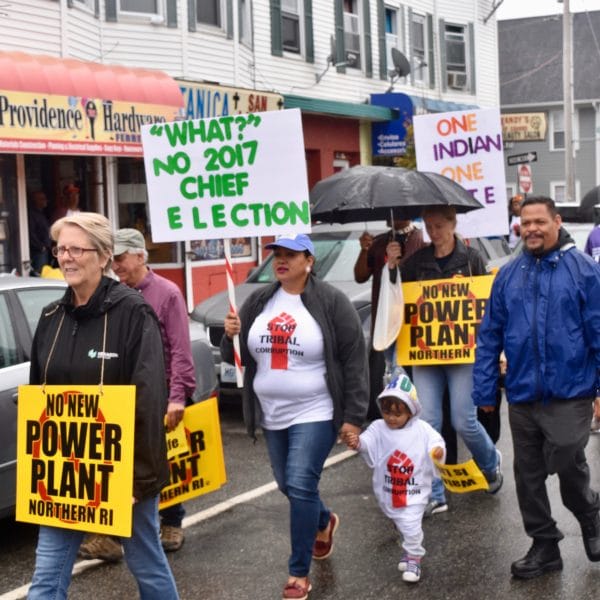Is the Energy Facilities Siting Board prepared to disentangle issues of tribal governance?
Is the Energy Facilities Siting Board (EFSB), a quasi-judicial permitting authority for all licenses required for siting, construction or alteration of a major energy facility in Rhode Island, the right place to be deciding upon issues of Narragansett Indian Tribe (NIT) governance? It’s possible that when Invenergy, the company that wants to construct a $1 billion fracked gas and diesel
October 27, 2017, 12:59 pm
By Steve Ahlquist
Is the Energy Facilities Siting Board (EFSB), a quasi-judicial permitting authority for all licenses required for siting, construction or alteration of a major energy facility in Rhode Island, the right place to be deciding upon issues of Narragansett Indian Tribe (NIT) governance?
It’s possible that when Invenergy, the company that wants to construct a $1 billion fracked gas and diesel oil burning power plant in the pristine forests of Burrillville, announced their deal to purchase water from the Narragansett Indian Reservation in Charlestown, they didn’t know about the complexities of an ongoing struggle for leadership within the tribe. But in closing the deal, Invenergy took a side in that struggle.
“The EFSB filings this week pertaining to the intervention motion of the Tribal Council of the Narragansett Indians (including Invenergy’s objection to the motion) show once again how far Invenergy is from having a satisfactory water plan,” said Conservation Law Foundation (CLF) Senior Attorney Jerry Elmer. “On September 28, 2017, when Invenergy announced that it had a contract with the Narragansetts to be a back-up supplier of water for Invenergy’s power plant, Invenergy was apparently blissfully unaware of the fact that it was stepping into the middle of a long-running dispute about tribal governance. Because of Invenergy’s ignorance and mis-step, Invenergy has now put the EFSB into the middle of that long-running dispute about tribal governance. In the most immediate sense, EFSB members are unlikely to be pleased about the position that Invenergy has put them in. In a broader sense, Invenergy’s ignorant mistake shows – once again – how far Invenergy is from having a satisfactory plan for obtaining water to cool its proposed power plant.”
The deal between Invenergy and the Narragansett Indian Tribe to purchase water to cool their proposed plant’s turbines came as a surprise to everyone: Narragansett Tribe members, the Narragansett Tribal Council, the Town of Charlestown and its leadership, and everyone else following the the power plant issue. Charlestown quickly motioned for and received intervenor status, as water will be drawn from an aquifer the Town shares with the Tribe. A public hearing will be held on the issue in Charlestown on December 5.
All the motions discussed in this piece can be accessed here.
The Tribal Council of the Narragansett Indian Tribe presented their motion to intervene on October 20th. In their motion to intervene the Tribal Council said, “That the Town and the NIT share a single sole-source aquifer does not bind their interest in this matter; instead it creates the potential for them to be adverse actors competing for the same limited resource. Charlestown must represent the interests of a specific population: its residents. The Tribal Council must represent the interests of a distinct population: its members. While there may be and one can certainly hope for occasions where these interests align, it would be foolish and short-sighted for anyone to assume that the Town of Charlestown can represent the interests of the Tribal Council.”
The Conservation Law Foundation immediately supported the Narragansett Tribal Council’s motion, as did the Town of Burrillville.
Invenergy objected.
Invenergy’s objection is based on a petition filed in Narragansett Indian Tribe Tribal Court by lawyers representing Narragansett Tribal leaders who dispute the legal authority of the Narragansett Tribal Council. The injunction refers to the Narragansett Tribal Council as “certain dissent members, or former members.” In the petition, it is noted that in 2016 the Narragansett Indian Tribe Tribal Court declared the Narragansett Tribal Council invalid.
Today, in a reply to Invenergy’s objection to the Narragansett Tribal Council’s motion, attorney Shannah Kurland presented an affidavit from Narragansett Chief Sachem Matthew Thomas noting that the “Tribal Court, except for a singular and unrelated issue, had been suspended in 2013 by action of the Tribal Assembly and the Tribal Government.”
There are similarities between how Invenergy has conducted itself in Rhode Island and how multinational companies all over the world interact with indigenous peoples. For instance, as reported The Weekend Autralian:
“MINING companies are circumventing Queensland Aboriginal cultural heritage laws to the detriment of sacred sites, an indigenous academic says.
“The allegation follows claims a Queensland coal seam gas company has destroyed ancient Aboriginal stone arrangements at Kogan, near Dalby.
“Indigenous academic Dr Jillian Marsh told AAP laws aimed at protecting indigenous sacred sites are generally tokenistic and toothless.
“She said it was common for mining companies to take a divide-and-conquer approach to negotiations with indigenous communities by dealing only with individuals who were sympathetic to their agenda.
“‘This pattern of behaviour by the mining industry is really very predatory,’ Dr Marsh said.
“‘They go in and cut private, secret deals.
“‘The people who benefit from it are the ones with the knowledge and information, and the rest are left out and disempowered.
“‘The people who are feeling like they’re being snubbed are usually the people who have the closest connection to the land and the greatest appreciation for the spiritual connection that people have had for years.'”
The struggle for leadership going on in the Narragansett Indian Tribe is complicated. Adjudicating the struggle is wildly outside the scope of the EFSB’s mandate and if the EFSB takes a position on matters of Narragansett Tribal leadership, they will be entering waters muddied by hundreds of years of colonization and genocide perpetrated upon indigenous people in this country.
Is a state level power plant licensing board the proper venue to decide such issues?
See previous coverage here:







